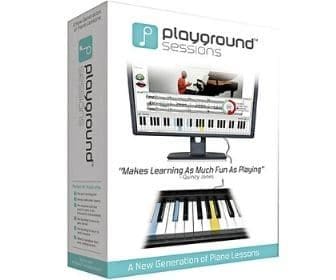Table of Contents
Introduction to Learning Piano with Group Classes
Engaging in group piano classes is an excellent way for individuals of all ages to embark on their musical journey. These classes not only foster a supportive learning environment but also encourage collaboration and camaraderie among students. From understanding basic notes and rhythms to delving into more complex compositions, group piano lessons can effectively cater to varied skill levels, promoting a holistic and interactive learning experience.
Benefits of Learning Piano in a Group Setting
Learning piano in a group setting naturally fosters a sense of camaraderie among students. Seeing peers progress and succeed serves as a motivational force, encouraging individuals to stay committed and practice regularly. The shared experiences can also foster a healthy competitive environment, pushing students to improve and excel in their musical skills.
Piano: Learn The Piano in 5 Easy Steps: A Self-Guided Piano Course for Beginners (with Online Video Instruction - Piano Learning Books for Beginning Piano Players)
17% OffHow to Read Music: Fundamentals of Music Notation Made Easy
11% OffIn This Together: A PBS American Portrait Story
$1.99 (as of December 27, 2025 23:37 GMT -08:00 - More infoProduct prices and availability are accurate as of the date/time indicated and are subject to change. Any price and availability information displayed on [relevant Amazon Site(s), as applicable] at the time of purchase will apply to the purchase of this product.)QMG Rainbow Color Piano and Keyboard Sticker and Kids Piano Learning Book Easy to Follow Instructions for Kids, Beginner Piano Book for Children, Easy Piano Sheet Music for Kids
$14.95 (as of December 27, 2025 19:03 GMT -08:00 - More infoProduct prices and availability are accurate as of the date/time indicated and are subject to change. Any price and availability information displayed on [relevant Amazon Site(s), as applicable] at the time of purchase will apply to the purchase of this product.)Groups provide an excellent opportunity for peer-to-peer learning. Students can exchange tips, discuss difficulties and share solutions, which enhances understanding and problem-solving abilities concerning music theory and piano techniques. The support from peers also helps maintain high spirits during challenging learning phases, making the experience more enjoyable and effective.
Group piano classes are generally more economical than individual lessons. This cost-effectiveness makes it accessible for more people to begin learning piano, without compromising the quality of tuition, as the group setting can still provide high-quality instruction and feedback.
One vital skill that group learning enhances is performing in an ensemble. Students learn to listen to each other and play in synchronization, which is crucial for any musician. This environment simulates real-world performances more closely than solitary practice sessions, preparing students for future opportunities to play with bands and orchestras.
A group setting introduces students to a wide range of musical interpretations and styles, as each individual may have different approaches and insights. This exposure is invaluable as it broadens a student’s musical horizons and deepens their understanding of different piano playing techniques and genres.
Piano: Learn The Piano in 5 Easy Steps: A Self-Guided Piano Course for Beginners (with Online Video Instruction - Piano Learning Books for Beginning Piano Players)
17% OffHow to Read Music: Fundamentals of Music Notation Made Easy
11% OffIn This Together: A PBS American Portrait Story
$1.99 (as of December 27, 2025 23:37 GMT -08:00 - More infoProduct prices and availability are accurate as of the date/time indicated and are subject to change. Any price and availability information displayed on [relevant Amazon Site(s), as applicable] at the time of purchase will apply to the purchase of this product.)QMG Rainbow Color Piano and Keyboard Sticker and Kids Piano Learning Book Easy to Follow Instructions for Kids, Beginner Piano Book for Children, Easy Piano Sheet Music for Kids
$14.95 (as of December 27, 2025 19:03 GMT -08:00 - More infoProduct prices and availability are accurate as of the date/time indicated and are subject to change. Any price and availability information displayed on [relevant Amazon Site(s), as applicable] at the time of purchase will apply to the purchase of this product.)Group settings are typically organized with a clear, structured learning path designed by an experienced instructor. This structure ensures that students cover all essential aspects of piano playing in a logical sequence, which can be far more effective than self-led learning where vital elements might be overlooked.
Regularly playing in front of classmates helps overcome stage fright and builds performance skills. The group setting mimics a live audience, providing a platform for students to become comfortable with public performances, which is essential for any performer’s growth.
In a group class, instructors provide continual feedback, not only to the individual but across the class. This communal feedback scenario often highlights common issues and solutions, benefiting all students. Moreover, encouragement from both peers and teachers boosts self-esteem and fosters a positive learning environment.
How to Find and Join a Group Piano Class
Finding and joining a group piano class can enhance your learning experience by providing a communal environment where you can learn from others. Here’s how to get started:
Begin by searching for local music schools, community centers, and conservatories that offer group piano classes. Many of these institutions provide a variety of programs tailored to different age groups and skill levels. Checking their websites, visiting the facilities in person, or calling them can give you a good sense of the type of classes offered and their schedule.
Use online platforms such as ClassPass, Meetup, or even local online forums. These websites often list music classes in your area and can provide reviews and ratings from other students. Online platforms can also offer virtual group classes, which can be a convenient option if you prefer learning from home.
Social media platforms like Facebook, Instagram, and local blogs often have advertisements or posts about group piano classes. Follow local music schools and community centers to get updates on new classes and promotional offers.
Word of mouth can be incredibly helpful. Ask friends, family, or colleagues if they know any good places that offer piano classes. They might even join with you, making learning a more fun and engaging experience.
Once you’ve identified a potential class, see if you can audit it first. This means attending one session without obligation to join, allowing you to get a feel for the teacher’s style and the group dynamics. Check with the institution if they allow auditing.
After deciding on the right group class for you, complete the registration process. This usually involves filling out a form and paying a fee. Be sure to ask about the curriculum, class schedule, and cancellation policies.
Engaging with Fellow Learners for Mutual Support
Participating in group piano classes presents unique opportunities for engaging with fellow learners. These interactions can enhance the learning experience, offer emotional support, and establish a community of like-minded individuals. Below are detailed ways to engage effectively with your peers in group piano classes.
Form Study Groups
Creating small study groups within the broader class can be beneficial. These groups allow learners to practice together, share tips, and provide one another with feedback on techniques. This peer-to-peer interaction often clarifies doubts more quickly and embeds learning deeper through teaching others.
Participate in Peer Performances
Regularly organize mini-concerts or performance evenings among your peers. These sessions serve as a platform to showcase your learning progress and receive constructive feedback. Performance, by its nature, can also help in shedding stage fright and enhancing stage presentation skills. Engage actively by both performing and being part of the audience to support your fellow learners.
Share Resources
Compile and exchange learning resources such as sheet music, practice exercises, and recordings of piano pieces. With the collective resources, you can explore a wider range of materials, helping to enrich your musical repertoire and understanding. This collaborative approach fosters a sense of community and collective growth.
Coordinate Practice Schedules
Try to synchronize your practice times with others from your class. Doing so can bring a structured routine and motivate each group member to adhere to their practice schedules. It also allows for shared practice sessions, which can be more enjoyable and yield real-time feedback and encouragement.
Engage in Constructive Competitions
Healthy competitions such as friendly challenges or informal contests can drive motivation and improve skills. Organizing such fun and educational competitions with your peers can foster learning through critical listening, creativity in musical expression, and mutual encouragement.
Develop a Support Network
Being part of a learning community means you have emotional as well as educational support. Lean on your group for motivation during challenging phases of learning and reciprocate when others are in need. This mutual support can play a crucial role in persistent and resilient learning journeys.
Practicing Group Performances for Confidence
Group performances are a significant component of learning piano in a class setting. They help students not only refine their skills but also build confidence and stage presence. Here are some detailed aspects of how group performances can foster confidence in students:
Ensemble Playing
Participating in an ensemble requires each student to synchronize with the group, fostering a sense of accountability and teamwork. This practice naturally enhances a pianist’s timing and rhythmic precision, qualities that are crucial in solo performances as well. It also allows students to experience the dynamics of playing in a group, such as leading and accompanying, which are vital skills for professional musicians. Confidence grows as students recognize their contributions to the group’s overall success.
Peer Feedback Sessions
After performing together, students often engage in feedback sessions where they can discuss what went well and what areas need improvement. These sessions are invaluable as they offer insights not only from the instructor but also from peers who might have faced or observed different challenges. Peer feedback is crucial as it contributes to building a supportive learning environment, encouraging open communication, and offering diverse perspectives.
Public Recitals
Many group piano classes prepare students for public performances. These recitals can be small, informal events for friends and family or more formal concerts. Participating in these recitals allows students to experience the feeling of performing in front of an audience, which is key to building performing confidence and reducing stage fear. Essentially, the more students get accustomed to performing publicly, the more their confidence grows.
Mock Auditions and Competitions
Some group classes host mock auditions or competitions where students can perform under pressure as they would in a real audition. This practice helps them build resilience and learn how to cope with nerves, further enhancing their confidence. As students face these controlled high-pressure environments, they learn to control their performance anxiety and enhance their focus.
Creative Collaborations
Group learning often involves creative projects, where students might collaborate on arranging a piece or composing together. These activities require creativity and communication, allowing students to express their musical ideas and learn how to negotiate and collaborate creatively. Through successful collaborations, students gain confidence in their creative abilities, boosting their overall confidence in their musical skills.
Using Group Classes to Stay Motivated
Group classes offer unique benefits that are especially valuable when learning the piano, a process that can sometimes feel isolating and daunting. These classes provide a community-centered learning environment that encourages consistent practice, friendly competition, and mutual support. Below are some ways in which group classes can help you stay motivated:
Conclusion
Learning piano through group classes offers a unique and enriching experience that combines structured learning with peer interaction. While it may challenge individual attention needs, the benefits of collaborative learning and cost-effectiveness make it a viable option for many students. Effectively incorporating regular practice, taking advantage of diverse learning styles, and engaging actively in group discussions can greatly enhance the learning experience. Ultimately, the success in learning piano in a group setting hinges on a blend of enthusiastic participation, supportive learning environments, and a commitment to consistent practice.







































